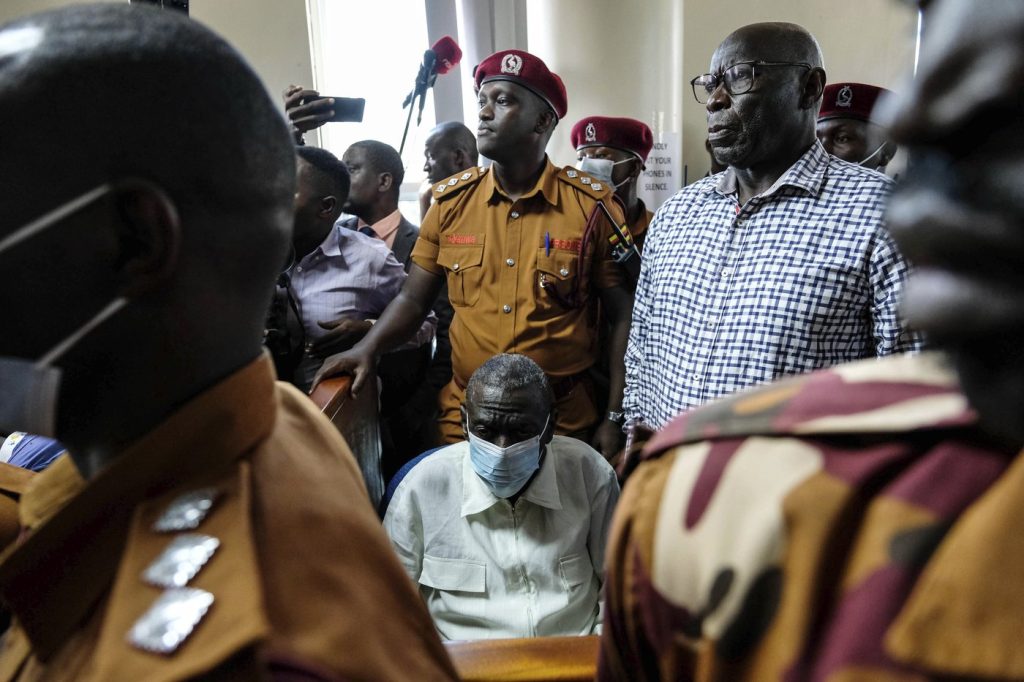KAMPALA, Uganda (AP) — Ugandan opposition leader Kizza Besigye was charged with treason on Friday, marking a significant escalation in his ongoing legal troubles. The charges stem from allegations that he plotted to forcibly remove the long-time leader of Uganda, President Yoweri Museveni, from power. Besigye, a prominent political figure and a four-time presidential candidate, appeared in a courtroom in Kampala while seated in a wheelchair, highlighting concerns regarding his health.
Treason in Uganda is a serious offense that carries the death penalty, emphasizing the gravity of Besigye's situation. The 68-year-old politician has been in custody since November 16, following his mysterious disappearance in Nairobi, Kenya. After being missing for several days, Besigye resurfaced in Kampala, where he was presented before a military tribunal on charges related to threats against national security. However, the Supreme Court intervened in his military trial last month, ruling that civilians cannot be tried by military courts.
Despite calls for Besigye's immediate release from his family, supporters, and various human rights organizations, he has been held in a maximum-security prison. Reports indicate that he has started a hunger strike in protest against his detention. His frail appearance in court has raised alarm among Ugandans, who fear that his potential harm in custody could lead to widespread unrest. As a result, many citizens and human rights advocates are requesting his release on humanitarian grounds.
This recent treason charge is not Besigye's first encounter with similar accusations. Previously, in 2005, he faced treason charges that ultimately did not proceed. Now, the current allegations suggest that he and associates participated in meetings across Europe and elsewhere, where he reportedly sought military, financial, and logistical support to topple the Ugandan government, as indicated in the charge sheet.
Besigye's attorney, Erias Lukwago, has denounced the case against his client as politically motivated. He expressed that the charges are a tactic to undermine Besigye's political influence and credibility just as the country gears up for presidential elections next year. President Museveni, in response to the unfolding events, has insisted that Besigye faces justice for the serious offenses he allegedly plotted. The president has dismissed calls for leniency, advocating instead for a swift trial to reveal the facts of the case.
As Uganda approaches its next presidential elections, Besigye's situation is being closely monitored by the public, who are concerned about potential political upheaval. President Museveni is expected to run for re-election, although speculation exists that he may consider stepping aside for his son, Gen. Muhoozi Kainerugaba, to take over in a non-violent succession. Gen. Kainerugaba has leveled accusations against Besigye, alleging that he plotted to assassinate his father and has publicly called for Besigye to face dire consequences for his alleged actions.
Moreover, the political landscape in Uganda is fraught with uncertainty, primarily because President Museveni, now 80 years old, lacks an apparent successor within the ruling National Resistance Movement party. Uganda has a historical context of power struggles, never witnessing a peaceful transfer of presidential authority since gaining independence from colonial rule over six decades ago. As a result, the implications of Besigye's charges resonate significantly within the broader political dynamics of the country, raising questions about future governance and stability.











